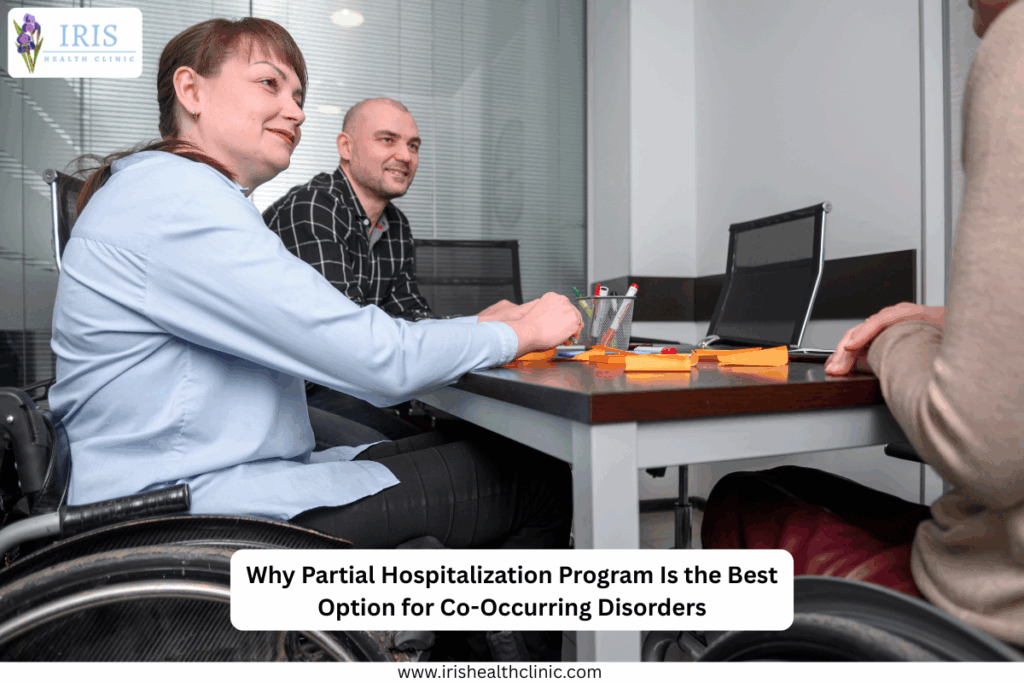Handling both mental health issues and substance use? It’s rough. Some days, you’re battling anxiety. Other days, you’re trying not to fall back into old habits. And some days, it’s both. At once. That’s what co-occurring disorders look like. And it’s more common than people think. Here’s the thing: treating one without the other doesn’t really work. That’s where a Partial Hospitalization Program comes in. It’s structured. Supportive. And it actually tackles both sides of the struggle—mental health and substance use.
What Are Co-Occurring Disorders?
It’s when someone has a mental health condition and a substance use disorder at the same time.
Think: depression and alcohol misuse. Anxiety and prescription pills. PTSD and cannabis dependency. The two feed off each other. One makes the other worse.
And it’s not rare. Many people deal with it. But most don’t get the right kind of help. They bounce between mental health clinics and rehab centers. They’re told to focus on “just one issue” at a time. That doesn’t work because they’re not two separate problems. They’re tangled together.
Why a Partial Hospitalization Program Just Makes Sense
A Partial Hospitalization Program, or PHP for short, is a form of intensive treatment that gives you the structure of inpatient care, without actually staying overnight.
You come in during the day, five to six days a week. You get therapy, support, medical supervision, group sessions—the whole package. It’s way more than a few therapy sessions. It’s not a casual check-in. It’s real, hands-on, guided recovery work.
Why It Works for Co-Occurring Disorders
Let’s say someone has depression and alcohol dependence. A regular therapy session once a week? Probably not enough.
A complete residential rehab? It might be too much.
But a partial hospitalization program for depression and substance use? That fits just right.
Here’s why:
- It includes mental health treatment and addiction recovery in the same plan
- You’re monitored daily, so any changes in behavior or health are caught early
- It gives structure to your days, which helps avoid relapse triggers
- You get access to medication management, therapy, and peer support
Everything is coordinated. Everyone’s on the same page. And that makes a huge difference.

Who Is It Best For?
PHPs aren’t for crisis-level emergencies. They’re for people who are stable enough to be safe at home, but need more than outpatient therapy.
It works well if:
- You’ve just finished inpatient care and need a transition
- You’ve been struggling with relapse and need structure
- You’ve tried outpatient care, but it wasn’t enough
- Your symptoms are affecting work, relationships, or daily functioning
- You want serious support without being away from home
If that’s you, or someone you care about, you’re not alone. And this might be exactly what’s needed.
What Does a Typical Day Look Like in a Partial Hospitalization Program?
Every place is a little different, but here’s a general idea:
Morning
- Check in with the staff
- Group therapy focused on coping skills or relapse prevention
Midday
- Individual therapy or family sessions
- Medication check-ins if needed
Afternoon
- Psychoeducation workshops (think: understanding trauma, anxiety, etc.)
- Creative or movement therapy (art, yoga, music, depending on the center)
End of Day
- Wrap-up, safety plan review, check-out
Then you go home. Eat dinner. Sleep in your bed. Wake up and do it again.
Not Just for Depression
While PHPs are often recommended for depression, they’re effective for other mental health challenges too.
Looking for a partial hospitalization program mental health option that treats anxiety? PTSD? Bipolar disorder? You’ll find that here. These programs are built to handle a mix of conditions, especially when they show up alongside substance use.
It’s all about treating the full picture, not just the symptoms that show first.
You Might Be Searching Right Now
Makes sense. Location matters. Nobody wants to travel across the city five days a week. That’s why more and more clinics are offering PHPs close to home.
Just remember, not all programs are equal. Look for one that:
- Specializes in co-occurring disorders
- Offers both mental health and addiction care
- Provides licensed therapists and medical staff
- Has positive reviews or a word-of-mouth reputation
- Offers flexible hours or options for working adults
If you’re already looking up partial inpatient program options, you’re on the right track.
The Real-Life Wins
Let’s be clear. PHPs aren’t magic cures. But they do give you real tools to build a better life.
- You’ll learn to manage your triggers.
- You’ll figure out healthier ways to cope.
- You’ll connect with others who get it.
And that feeling? That you’re not alone? That might be the biggest win of all.
When You’re Tired of Starting Over
Co-occurring disorders can feel like a loop you can’t break. You try to fix one thing, but the other pulls you back in. Over and over.
But that loop? It can be broken. With the right support. With a plan that actually sees all of you. Not just your symptoms. Not just your addiction. But the whole you.
Conclusion
Struggling with both mental health and addiction is tough. But you don’t have to go it alone. A Partial Hospitalization Program offers structure, support, and a clear path forward. Whether you’re looking for a partial hospitalization program near me or just exploring your options, remember: You deserve treatment that works for all of you.
At Iris Health Clinic, we specialize in integrated care for co-occurring disorders. Our team understands the balance, the struggles, and the healing it takes. We’re here to guide you through it.

